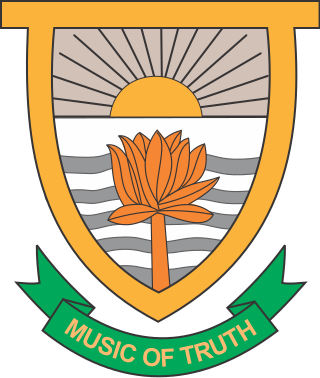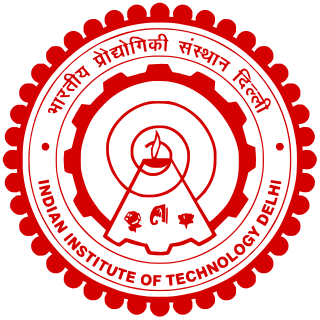
The Indian Institute of Technology Bombay is a public research university and technical institute in Mumbai, Maharashtra, India.

Indian Institute of Technology, Roorkee is a technical university located in Roorkee, Uttarakhand, India. It is the oldest engineering institution in India. It was founded as the College of Civil Engineering in 1847 during East India Company rule in India by James Thomason, the Lieutenant-Governor of the North-Western Provinces in which Roorkee was located; its purpose was to train officers and surveyors employed in the construction of the Ganges Canal. In 1854, after the completion of the canal and Thomason's death, it was renamed the Thomason College of Civil Engineering by Proby Cautley, the designer and projector of the canal. It was renamed University of Roorkee in 1949, and again renamed IIT Roorkee in 2001. The institution has 22 academic departments covering Engineering, Applied Sciences, Humanities & Social Sciences and Management programs with an emphasis on scientific and technological education and research.

The Indian Institute of Technology Guwahati (IIT Guwahati) is a public technical university established by the Government of India, located in Amingaon area, North Guwahati Village area, in the state of Assam in India. It is the sixth Indian Institute of Technology established in India. IIT Guwahati is officially recognised as an Institute of National Importance by the government of India. IIT Guwahati has been ranked 7th in Engineering and 9th in Overall category in NIRF Rankings 2024.

Panjab University (PU) is an Indian collegiate public state university located in Chandigarh. Funded through both State and Union governments, it is considered a state university. It traces its origins to the University of the Punjab in Lahore, which was founded in 1882. After the partition of India, the university was established on 1 October 1947, and called East Punjab University. Initially housed primarily at a cantonment in Solan, it later relocated to a newly built campus in Chandigarh, and was renamed Panjab University. It is accredited by NAAC at five star level, with the highest NAAC A++ accreditation grade.

The Wilson College, established in 1832 in Mumbai, is one of India's oldest colleges; its foundation precedes that of the University of Mumbai,, by 25 years. Wilson College was granted autonomy by Mumbai University in November 2021. It was awarded an A rating by the National Assessment and Accreditation Council (NAAC) in 2005.

The University of Delhi, informally known as Delhi University, is a collegiate research central university located in Delhi, India. It was founded in 1922 by an Act of the Central Legislative Assembly and is recognised as an Institute of Eminence (IoE) by the University Grants Commission (UGC). The Vice President of India serves as the university chancellor. The university is ranked 6th by National Institutional Ranking Framework 2024.

Punjabi University is a collegiate state public university located in Patiala, Punjab, India. It was established on 30 April 1962 and is only the second university in the world to be named after a language, after Hebrew University of Israel. Originally it was conceived as a unitary multi-faculty teaching and research university, primarily meant for the development and enrichment of the Punjabi language and culture, but alive to the social and education requirements of the state.

Hindu College is a constituent college of the University of Delhi. Founded in 1899, it offers undergraduate and postgraduate programmes in the sciences, humanities and commerce.

The University of Kelaniya is a public university in Sri Lanka. Just outside the municipal limits of Colombo, in the city of Kelaniya, the university has two major institutions and seven faculties.
The Institute for Social and Economic Change (ISEC) is a social science research institute in Bangalore, India. Founded in 1972, it is the largest among the 27 institutions supported by Indian Council of Social Science Research (ICSSR).

The Indian Institute of Technology Madras is a public technical university located in Chennai, Tamil Nadu, India. It is one of the eight public Institutes of Eminence of India. As an Indian Institute of Technology (IIT), IIT Madras is also recognised as an Institute of National Importance.

Sambalpur University is a public research university located in Burla town, of district Sambalpur, India, in the state of Odisha. Popularly known as Jyoti Vihar, it offers courses at the undergraduate, post-graduate and doctoral (Ph.D.) levels. The governor of Odisha is the chancellor of the university. The campus is located 15 km away from Sambalpur.

The Faculty of Law, University of Delhi is the law department of the University of Delhi. It has the unique distinction of producing the largest number of sitting judges of the Supreme Court of India, with many notable alumni's from various fields.

Pondicherry University, also known as PU, is a central research university located in Kalapet, Pondicherry in Union Territory of Puducherry, India. It was established by an Act of Parliament in 1985 by the Department of Higher Education, Ministry of Education, Government of India. The Vice President of India is the Chancellor along with the Lieutenant Governor of Puducherry acting as the Chief Rector and the President of India is the Visitor of the university. The university is a collegiate university with its jurisdiction spread over the Union Territory of Puducherry located in Tamil Nadu, Kerala (Mahé) and Andhra Pradesh (Yanam), and Union Territory of Andaman and Nicobar Islands. The vast jurisdiction over three Union Territories namely gives the university a national character. The residents speak diverse languages such as English, Tamil, Telugu, Malayalam, Hindi, Bengali, Odia, Assamese, Kannada and French.

Chaudhary Charan Singh Haryana Agricultural University is a public funded agricultural university located at Hisar in the Indian state of Haryana. It is the biggest agricultural university in Asia. The university has 8,645 acres (3,499 ha) of land. It is named after India's fifth Prime Minister, Chaudhary Charan Singh. It was ranked 7th in India by the National Institutional Ranking Framework in the agriculture and allied sector ranking for 2024.

The Government Medical College, Thiruvananthapuram, is a public medical college in Thiruvananthapuram, Kerala, India. Founded in 1951, it was inaugurated by Prime Minister Jawaharlal Nehru and is Kerala's first ever Medical College.

The Indian Institute of Technology Delhi(IIT- Delhi) is a public institute of technology located in Delhi, India. It is one of the 23 Indian Institutes of Technology created to be Centre of Excellence for India's training, research and development in science, engineering and technology.
After-school activities, also known as after-school programs or after-school care, started in the early 1900s mainly just as supervision of students after the final school bell. Today, after-school programs do much more. There is a focus on helping students with school work but can be beneficial to students in other ways. An after-school program, today, will not limit its focus on academics but with a holistic sense of helping the student population. An after-school activity is any organized program that youth or adult learner voluntary can participate in outside of the traditional school day. Some programs are run by a primary or secondary school, while others are run by externally funded non-profit or commercial organizations. After-school youth programs can occur inside a school building or elsewhere in the community, for instance at a community center, church, library, or park. After-school activities are a cornerstone of concerted cultivation, which is a style of parenting that emphasizes children gaining leadership experience and social skills through participating in organized activities. Such children are believed by proponents to be more successful in later life, while others consider too many activities to indicate overparenting. While some research has shown that structured after-school programs can lead to better test scores, improved homework completion, and higher grades, further research has questioned the effectiveness of after-school programs at improving youth outcomes such as externalizing behavior and school attendance. Additionally, certain activities or programs have made strides in closing the achievement gap, or the gap in academic performance between white students and students of color as measured by standardized tests. Though the existence of after-school activities is relatively universal, different countries implement after-school activities differently, causing after-school activities to vary on a global scale.
Chaudhary Devi Lal University, named after former Deputy Prime Minister of India Chaudhary Devi Lal, was established by the Government of Haryana on April 2, 2003. The University is located at Sirsa, 256 km from Delhi and 285 km from Chandigarh. It has an area of 280 acres (1.1 km2) on the Barnala Road. The University has twenty-four academic departments that offer twenty-one career oriented and specialized courses to the students. It also offers job-oriented courses through distance education.

Indira Gandhi Delhi Technical University for Women (IGDTUW), is an all women's university located in Delhi, India on the heritage campus at Kashmere Gate, Delhi. It was founded as the Indira Gandhi Institute of Technology in 1998. In May 2013 it gained autonomy and became the first women's technical university in India established by Govt. of Delhi. The university offers BBA and BTech, MTech, and PhD programs in four branches of engineering i.e. in the field of Computer Science and Engineering, Electronics and Communication Engineering, Mechanical and Automation Engineering and Information Technology. The university also offers 5 years program in Bachelors of Architecture (B.Arch.) and a 2-year post graduate program in M. Plan.




































